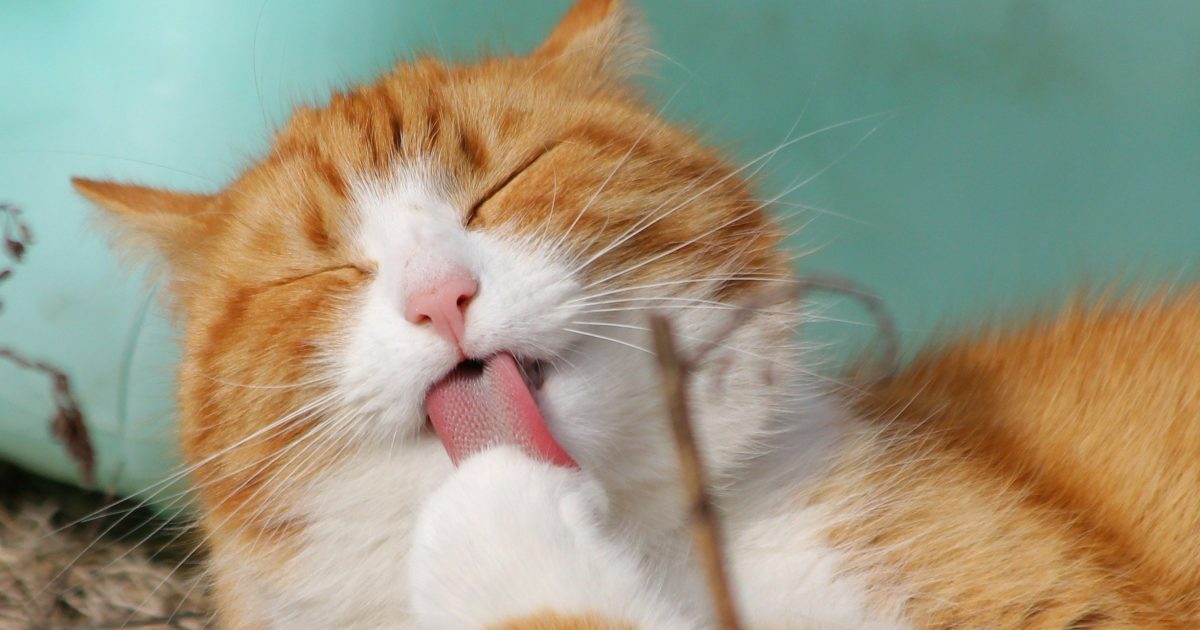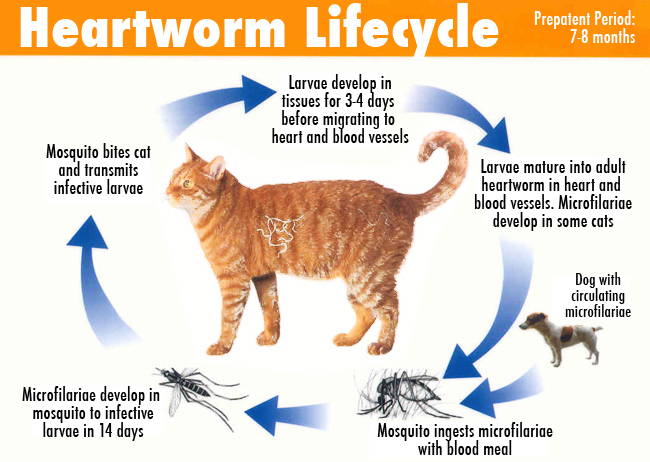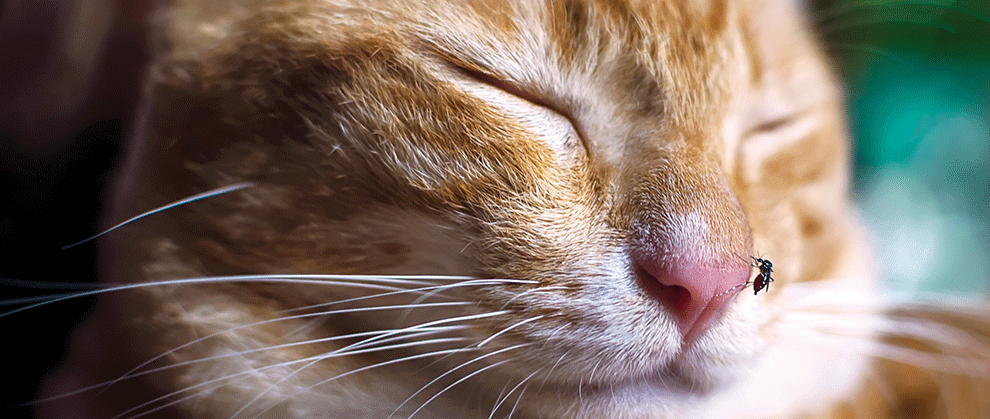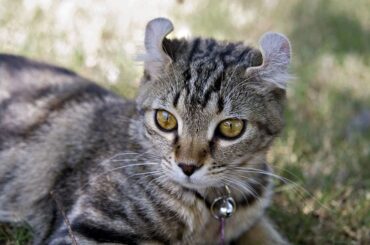Heartworms in cats – Dirofilaria immitis, a parasite transmitted by mosquitos, causes heartworm disease. While cats are susceptible to heartworm, they are imperfect hosts who are somewhat resistant. Cats are significantly less likely than dogs to contract heartworm in the same geographic area, with about 10-20% of cats infected. Heartworm disease in cats differs significantly from that in dogs. The cat is an unusual host for heartworms because the majority of worms in cats do not reach adulthood.
Adult heartworms in cats usually only have one to three worms, and many cats with heartworms have no adult worms. While this means that heartworm disease in cats is frequently undetected, it’s crucial to remember that even juvenile worms can cause serious problems in the form of heartworm-linked pulmonary disease.

Even if heartworms do not appear to be a problem in your area, many variables must be addressed. Heartworm disease may be more widespread in your neighborhood than you realize, or you may mistakenly travel with your pet to an area where heartworms are more prevalent. Each year, heartworm illness spreads to new parts of the country.
Heartworms can be carried by stray and neglected canines, as well as certain wildlife. The spread of heartworm disease is aided by mosquitoes flown long distances by the wind and the relocation of sick pets to formerly uninfected areas. Infection rates vary drastically from year to year, even within communities, due to a variety of factors ranging from climate changes to the presence of wildlife carriers. Because contaminated mosquitoes can enter the house, making the cat is at greater risk.
Table of Contents
Signs and symptoms of heartworms in cats
Heartworms in cats can manifest themselves in a variety of ways, from mild to catastrophic. Symptoms may include the following:
- Coughing
- Asthma-like symptoms
- Vomiting on a regular basis
- Appetitelessness
- Loss of weight.
- Walking is difficult.
- Cat got fainted or had seizures?
- Suffer from a build-up of fluid in the abdomen
- The sudden collapse of the cat
- The cat died suddenly after collapsing.
Transmission indices of heartworms in cats
The heartworm’s life cycle is complicated, and it takes two host animals to complete it. Heartworms require a mosquito as an intermediate host, and a variety of mosquito species can serve as hosts and transmit heartworms.

Mosquitoes consume juvenile heartworm larvae, known as microfilariae, by feeding on an infected cat or, more typically, a dog infected with the parasite. The microfilariae continue to develop in the mosquito’s gut for 10 to 30 days before entering its mouthparts. When a cat is bitten by an infected mosquito, the insect injects infective larvae into the cat.
The larvae enter the bloodstream and end up in the pulmonary arteries and the right side of the heart. Within 6 to 7 months, they grow into adult heartworms capable of reproduction. Cats are resistant hosts, and there are usually few circulating microfilariae. In order for a cat to become infected with heartworms, it must be bitten by an infected mosquito as part of the life cycle.
Heartworms are not passed from one cat to another or from a dog to a cat directly. When mosquitoes are actively feeding, the risk of infection is greatest. This usually necessitates temperatures above 20°C.
Diagnosis
Heartworms are diagnosed using a variety of procedures; in many cases, a combination of tests is required. Coughing and rapid breathing are the most typical symptoms, which can also be caused by a variety of other illnesses. Weight loss and vomiting are two further non-specific clinical indications. Heartworms in cats illness can be discovered on a post-mortem examination after an apparently normal cat is found dead or has an abrupt overwhelming respiratory failure.

Positive tests, enlarged arteries on radiography, and cardiac abnormalities raise the risk of heartworm infection. However, no test is perfect, so your veterinarian will use a combination of physical exam findings and many types of tests to evaluate the severity of heartworm illness in your cat. Some diagnosis methods include
- Because cats rarely have circulating microfilaria, microfilaria tests may result in a lot of false negatives.
- Antibody blood tests can detect immature infections two months after they have occurred.
- Antigen blood tests: This technique of testing will miss some feline infections because cats might have very low and single-sex (i.e. all male) worm burdens.
- X-rays of the chest may aid in the diagnosis of feline heartworm illness.
- The actual live worms in the pulmonary artery and right side of the heart can be seen via echocardiography (heart ultrasound).
Treatment of Heartworms in cats
Because medicinal care of heartworms in cats is challenging, surgery to remove heartworms is the preferred form of treatment. Heartworms in cats are tough to treat. Many common medicines are hazardous to cats, including the most used canine therapy, melarsomine. The American Heartworm Society, the foremost authority on the treatment of heartworm-infected dogs, does not currently advocate the use of adult heartworm-killing medicines in cats.
Steroids, such as prednisolone, may be prescribed by veterinarians to reduce a cat’s natural high inflammatory reaction. Acute respiratory distress and shock in cats will necessitate supportive care and therapy. To aid in the removal of microorganisms, your veterinarian may prescribe the antibiotic doxycycline. Because medicinal care of heartworms in cats is challenging, surgery to remove heartworms is the preferred form of treatment.
RECOMMENDED ARTICLES
- Loss Of Balance In Cat – Causes, Symptoms And Treatment
- Botflies In Cats – Life Cycle, Symptoms And Treatment Plan
- Anaphylaxis In Cats- Causes, Symptoms And Treatment
- Malnutrition In Cats And Management




